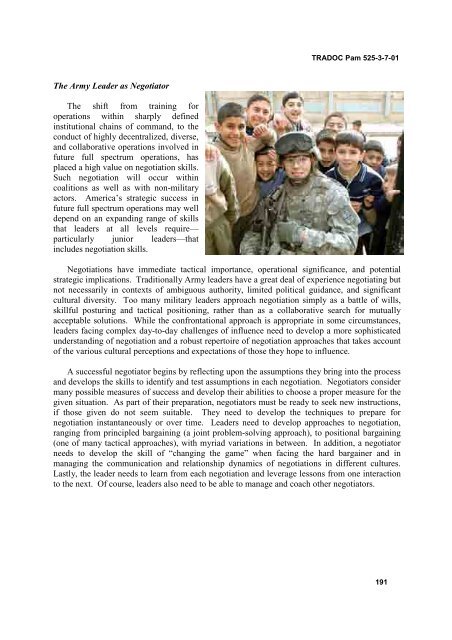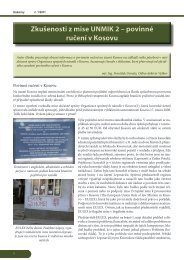- Page 2 and 3:
TRADOC Pam 525-3-7-01This page inte
- Page 4 and 5:
TRADOC Pam 525-3-7-01This page inte
- Page 6 and 7:
TRADOC Pam 525-3-7-01This page inte
- Page 8 and 9:
TRADOC Pam 525-3-7-01reference docu
- Page 10 and 11:
TRADOC Pam 525-3-7-01Contents, cont
- Page 12 and 13:
TRADOC Pam 525-3-7-01This page inte
- Page 14 and 15:
TRADOC Pam 525-3-7-01Man is the fir
- Page 16 and 17:
TRADOC Pam 525-3-7-01The Army’s H
- Page 18 and 19:
TRADOC Pam 525-3-7-011-5. The Futur
- Page 20 and 21:
TRADOC Pam 525-3-7-01Every war is g
- Page 22 and 23:
TRADOC Pam 525-3-7-01suppress Insur
- Page 24 and 25:
TRADOC Pam 525-3-7-01To promulgate
- Page 26 and 27:
TRADOC Pam 525-3-7-01to Army member
- Page 28 and 29:
TRADOC Pam 525-3-7-01city and captu
- Page 30 and 31:
TRADOC Pam 525-3-7-01was a professi
- Page 32 and 33:
TRADOC Pam 525-3-7-01This page inte
- Page 34 and 35:
TRADOC Pam 525-3-7-01If you know th
- Page 36 and 37:
TRADOC Pam 525-3-7-01Understanding
- Page 38 and 39:
TRADOC Pam 525-3-7-01Combined with
- Page 40 and 41:
TRADOC Pam 525-3-7-01economy. 19 Th
- Page 42 and 43:
TRADOC Pam 525-3-7-01means they may
- Page 44 and 45:
TRADOC Pam 525-3-7-01MNCs constitut
- Page 46 and 47:
TRADOC Pam 525-3-7-01Demographics a
- Page 48 and 49:
TRADOC Pam 525-3-7-01consensus hold
- Page 50 and 51:
TRADOC Pam 525-3-7-01overall health
- Page 52 and 53:
TRADOC Pam 525-3-7-01Globalization
- Page 54 and 55:
TRADOC Pam 525-3-7-01certainly laid
- Page 56 and 57:
TRADOC Pam 525-3-7-01Questions for
- Page 58 and 59:
TRADOC Pam 525-3-7-01Even with the
- Page 60 and 61:
TRADOC Pam 525-3-7-01Character deve
- Page 62 and 63:
TRADOC Pam 525-3-7-01The Army belie
- Page 64 and 65:
TRADOC Pam 525-3-7-01Army must tail
- Page 66 and 67:
TRADOC Pam 525-3-7-01courage requir
- Page 68 and 69:
TRADOC Pam 525-3-7-01Figure 3-1. De
- Page 70 and 71:
TRADOC Pam 525-3-7-01of purpose and
- Page 72 and 73:
TRADOC Pam 525-3-7-01Research confi
- Page 74 and 75:
TRADOC Pam 525-3-7-01Military cultu
- Page 76 and 77:
TRADOC Pam 525-3-7-01one’s own mo
- Page 78 and 79:
TRADOC Pam 525-3-7-01Americans norm
- Page 80 and 81:
TRADOC Pam 525-3-7-01Regardless of
- Page 82 and 83:
TRADOC Pam 525-3-7-01In the theater
- Page 84 and 85:
TRADOC Pam 525-3-7-01Sergeant First
- Page 86 and 87:
TRADOC Pam 525-3-7-01Doctrine must
- Page 88 and 89:
TRADOC Pam 525-3-7-01 Officer and N
- Page 90 and 91:
TRADOC Pam 525-3-7-01This page inte
- Page 92 and 93:
TRADOC Pam 525-3-7-01You have to le
- Page 94 and 95:
TRADOC Pam 525-3-7-01After determin
- Page 96 and 97:
TRADOC Pam 525-3-7-01generic assess
- Page 98 and 99:
TRADOC Pam 525-3-7-01Overload, prog
- Page 100 and 101:
TRADOC Pam 525-3-7-01aspects of the
- Page 102 and 103:
TRADOC Pam 525-3-7-01unwieldy ancho
- Page 104 and 105:
TRADOC Pam 525-3-7-01Questions for
- Page 106 and 107:
TRADOC Pam 525-3-7-01The Nation tha
- Page 108 and 109:
TRADOC Pam 525-3-7-01experiences to
- Page 110 and 111:
TRADOC Pam 525-3-7-01The Army is in
- Page 112 and 113:
TRADOC Pam 525-3-7-01Multi-skilled
- Page 114 and 115:
TRADOC Pam 525-3-7-01courses of act
- Page 116 and 117:
TRADOC Pam 525-3-7-01for conducting
- Page 118 and 119:
TRADOC Pam 525-3-7-01learning and a
- Page 120 and 121:
TRADOC Pam 525-3-7-01Figure 5-2. Ev
- Page 122 and 123:
TRADOC Pam 525-3-7-01providing grea
- Page 124 and 125:
TRADOC Pam 525-3-7-01Units will be
- Page 126 and 127:
TRADOC Pam 525-3-7-01experiential l
- Page 128 and 129:
TRADOC Pam 525-3-7-01insertion of l
- Page 130 and 131:
TRADOC Pam 525-3-7-01training. Trai
- Page 132 and 133:
TRADOC Pam 525-3-7-01skills. HPI te
- Page 134 and 135:
TRADOC Pam 525-3-7-01environment. B
- Page 136 and 137:
TRADOC Pam 525-3-7-01he still neede
- Page 138 and 139:
TRADOC Pam 525-3-7-01This page inte
- Page 140 and 141:
TRADOC Pam 525-3-7-01One-and-a-half
- Page 142 and 143:
TRADOC Pam 525-3-7-01the bitter dry
- Page 144 and 145:
TRADOC Pam 525-3-7-01stresses from
- Page 146 and 147: TRADOC Pam 525-3-7-01Despite the nu
- Page 148 and 149: TRADOC Pam 525-3-7-016-3. BurnoutCo
- Page 150 and 151: TRADOC Pam 525-3-7-01“It’s not
- Page 152 and 153: TRADOC Pam 525-3-7-01 Officer and N
- Page 154 and 155: This page intentionally left blank.
- Page 156 and 157: TRADOC Pam 525-3-7-01The Army recru
- Page 158 and 159: TRADOC Pam 525-3-7-01The third comp
- Page 160 and 161: TRADOC Pam 525-3-7-01Altering the P
- Page 162 and 163: TRADOC Pam 525-3-7-01The Army must
- Page 164 and 165: TRADOC Pam 525-3-7-01demonstrate an
- Page 166 and 167: TRADOC Pam 525-3-7-01These new cond
- Page 168 and 169: TRADOC Pam 525-3-7-01challenging bu
- Page 170 and 171: TRADOC Pam 525-3-7-01and one as the
- Page 172 and 173: TRADOC Pam 525-3-7-01Leadership doc
- Page 174 and 175: TRADOC Pam 525-3-7-01This page inte
- Page 176 and 177: TRADOC Pam 525-3-7-01Science can on
- Page 178 and 179: TRADOC Pam 525-3-7-01operations, su
- Page 180 and 181: TRADOC Pam 525-3-7-01EnergyAlternat
- Page 182 and 183: TRADOC Pam 525-3-7-01The program’
- Page 184 and 185: TRADOC Pam 525-3-7-01undergone a gr
- Page 186 and 187: TRADOC Pam 525-3-7-01Required Capab
- Page 188 and 189: TRADOC Pam 525-3-7-01This page inte
- Page 190 and 191: TRADOC Pam 525-3-7-01Soldiers comin
- Page 192 and 193: TRADOC Pam 525-3-7-01dilemma as it
- Page 194 and 195: TRADOC Pam 525-3-7-01command list f
- Page 198 and 199: TRADOC Pam 525-3-7-019-3. Leadershi
- Page 200 and 201: TRADOC Pam 525-3-7-01The cauldron o
- Page 202 and 203: TRADOC Pam 525-3-7-01Selecting lead
- Page 204 and 205: TRADOC Pam 525-3-7-01Topping’s cr
- Page 206 and 207: TRADOC Pam 525-3-7-01Required Capab
- Page 208 and 209: This page intentionally left blank.
- Page 210 and 211: TRADOC Pam 525-3-7-01The greatest l
- Page 212 and 213: TRADOC Pam 525-3-7-01organization i
- Page 214 and 215: TRADOC Pam 525-3-7-01special spirit
- Page 216 and 217: TRADOC Pam 525-3-7-01Operation Thun
- Page 218 and 219: TRADOC Pam 525-3-7-01This page inte
- Page 220 and 221: TRADOC Pam 525-3-7-01Joint Training
- Page 222 and 223: TRADOC Pam 525-3-7-01Chiarelli, P.
- Page 224 and 225: TRADOC Pam 525-3-7-01Headquarters,
- Page 226 and 227: TRADOC Pam 525-3-7-01Maffey, Tom (2
- Page 228 and 229: TRADOC Pam 525-3-7-01Prensky, M. (2
- Page 230 and 231: TRADOC Pam 525-3-7-01Stouffer, S.,
- Page 232 and 233: TRADOC Pam 525-3-7-01Woodruff, T. D
- Page 234 and 235: TRADOC Pam 525-3-7-01OIFOPFOROPTEMP
- Page 236 and 237: TRADOC Pam 525-3-7-01general adapta
- Page 238 and 239: TRADOC Pam 525-3-7-01and to underst
- Page 240 and 241: TRADOC Pam 525-3-7-0144 Cullinae, 2
- Page 242 and 243: TRADOC Pam 525-3-7-01128 Johnson, M
- Page 244 and 245: TRADOC Pam 525-3-7-01238



